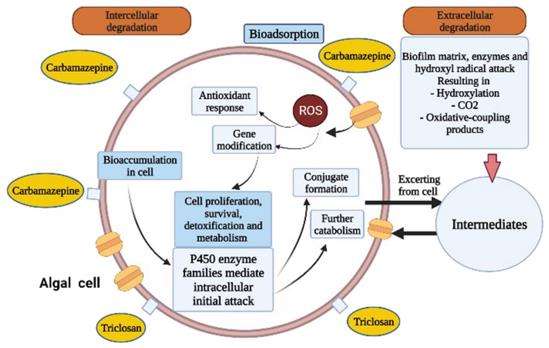Algae-Based Atmospheric Pollution Treatment Service
Due to their significant biosorption capacity, macroalgae and microalgae can be used as safe methods to reduce air pollution and fix CO2.
As a professional algae research and application development company, Lifeasible has extensive experience in algae solutions for environmental pollution, carbon neutralization, wastewater treatment, and other conservation issues, and is capable of providing professional algae-based atmospheric pollution treatment services.
Introduction to Bioremediation Technologies
Bioremediation technology is an innovative environmental remediation solution that allows sustainable environmental remediation using algae, actinomycetes, bacteria, and fungi. Bioremediation is primarily through the biosorption and bioaccumulation of contaminants, as well as intracellular and extracellular degradation.
 Fig.1 Mechanisms of pollutant removal and algal metabolism. (Kavusi, E., et al., 2022, Environmental Science and Pollution Research International)
Fig.1 Mechanisms of pollutant removal and algal metabolism. (Kavusi, E., et al., 2022, Environmental Science and Pollution Research International)
Components of Industrial Flue Gases
The fuel gases from the combustion of fossil fuels contain not only large amounts of CO2, sulfur oxides, and nitrogen oxides, but also many types of heavy metals, which have a huge ecological impact, as increasing the risk of bioaccumulation of heavy metals in the food chain and posing a greater health risk to local populations.
Ammonia Oxides Control
It is found that the microalga Scenedesmus dimorphus could be used to reduce ammonia levels in animal housing, with ammonia removal rates consistently above 93% at pH values of 5, 6, and 7 in the growth environment.
Sulfur Oxides Control
It is found that when the pH is stabilized at 8.0 using NaOH solution and a high concentration of SO2, the growth rate of microalgae will not be affected and have a high scavenging rate of sulfur.
Airborne Heavy Metal Control
Metal biosorption using microalgae has many advantages such as time and power savings, eco-friendly, year-round occurrence, and the ability to incorporate up to 10% of their biomass. Metal analysis shows that Cd, Co, Cu, Pb, and Zn are strongly adsorbed in the microalgae, while the adsorption capacity for As, Cr, Ni, and Se was relatively poor.
Reduction in the Concentration of Greenhouse Gases
Autotrophic or photosynthetic microalgae have 10-50 times the CO2-fixing capacity of plants and are capable of producing large amounts of O2 and organic carbon. To reduce CO2 in the environment, power stations may inject flue gas into the growth medium of microalgae or cultivate them in raceway ponds.
Our Services
Algae are powerful tools for purifying the air, capable of producing oxygen while eliminating pollutants and greenhouse gases.
Lifeasible is committed to the development of algae for environmental remediation and to providing quality algae-based atmospheric pollution treatment services to our customers worldwide.

Engineering Design of the Device
Including architectural algae cladding systems for photosynthesis and flue gas adsorption systems for industrial applications.

Gas Monitoring
Real-time monitoring of ambient air and flue gases to observe the adsorption of greenhouse gases, nitrogen and sulfur oxides, and heavy metals by algae

Algal Growth Monitoring
Real-time monitoring of algae growth, nutrient concentration in the algae growth environment, and pH conditions
Why Choose Us
With years of experience in research and application development on algae, Lifeasible is capable to provide professional algae-based atmospheric pollution treatment services for our clients worldwide. Please contact us for more information.
Reference
- Kavusi, E., Dehghanian, Z., Pandey, J., Price, G. W., & Astatkie, T. (2022). Removal of organic and inorganic contaminants from the air, soil, and water by algae. Environmental Science and Pollution Research International.
Our services are for research use only and not for any clinical use.